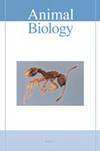Repulsive and attractive response of mature Rattus rattus towards conspecific natural urinary signals of the same and the opposite sex
IF 1.4
4区 生物学
Q2 ZOOLOGY
引用次数: 0
Abstract
Urinary signals play an important role in communication between the individuals of the same species. The present study observed the response of mature male and female Rattus rattus towards conspecific natural urine of the same and the opposite sex. Responses to urine signals were determined based on food consumption on the treated and untreated sides of the cage. Mature male rats consumed significantly more food when treated with the urine of grouped mature female rats and female rats in the oestrous, pro-oestrous, di-oestrous, metoestrous, and lactation stages, while significantly low food consumption was observed in male rats in response to the urine of individual and grouped mature male rats, indicating strong attraction to the urine of the opposite sex and strong repulsion towards urine of the same sex. Similar observations were confirmed in bi-choice and multichoice maze experiments. Male rats did not show any significant response towards the urine of pregnant females. Under simulated store conditions, repulsion towards urine of the same sex was shown up to six days of exposure while the attraction towards the urine of the opposite sex was shown up to three days of exposure. Under simulated field conditions, the repulsive effect towards urine of the same sex remained for 9-13 days and the attractant effect to the urine of the opposite sex remained for all 15 days of the experiment. The study thus indicates that the reproductive condition of rats influences the communicative signals they produce as well as their own responses to conspecific signals of the same and the opposite sex.成熟老鼠对同种异性自然排尿信号的排斥和吸引反应
尿液信号在同一物种个体之间的交流中发挥着重要作用。本研究观察了成熟雄性和雌性鼠类对同种和异种天然尿液的反应。根据笼子处理侧和未处理侧的食物消耗量来确定对尿液信号的反应。成熟雄性大鼠对分组成熟雌性大鼠和处于发情期、前发情期、二发情期、后发情期和哺乳期的雌性大鼠尿液的摄食量明显增加,而雄性大鼠对个体和分组成熟雄性大鼠尿液的摄食量明显减少,这表明雄性大鼠对异性尿液有强烈的吸引力,对同性尿液有强烈的排斥力。类似的观察结果在双选和多选迷宫实验中也得到了证实。雄性大鼠对怀孕雌性大鼠的尿液没有明显反应。在模拟仓库条件下,大鼠对同性尿液的排斥反应持续到接触尿液的六天,而对异性尿液的吸引反应则持续到接触尿液的三天。在模拟野外条件下,对同性尿液的排斥作用持续了 9-13 天,而对异性尿液的吸引作用则持续了整个实验的 15 天。因此,这项研究表明,大鼠的繁殖状况会影响它们产生的交流信号,以及它们自身对同种异性信号的反应。
本文章由计算机程序翻译,如有差异,请以英文原文为准。
求助全文
约1分钟内获得全文
求助全文
来源期刊

Animal Biology
生物-动物学
CiteScore
2.10
自引率
0.00%
发文量
34
审稿时长
3 months
期刊介绍:
Animal Biology publishes high quality papers and focuses on integration of the various disciplines within the broad field of zoology. These disciplines include behaviour, developmental biology, ecology, endocrinology, evolutionary biology, genomics, morphology, neurobiology, physiology, systematics and theoretical biology. Purely descriptive papers will not be considered for publication.
Animal Biology is the official journal of the Royal Dutch Zoological Society since its foundation in 1872. The journal was initially called Archives Néerlandaises de Zoologie, which was changed in 1952 to Netherlands Journal of Zoology, the current name was established in 2003.
 求助内容:
求助内容: 应助结果提醒方式:
应助结果提醒方式:


